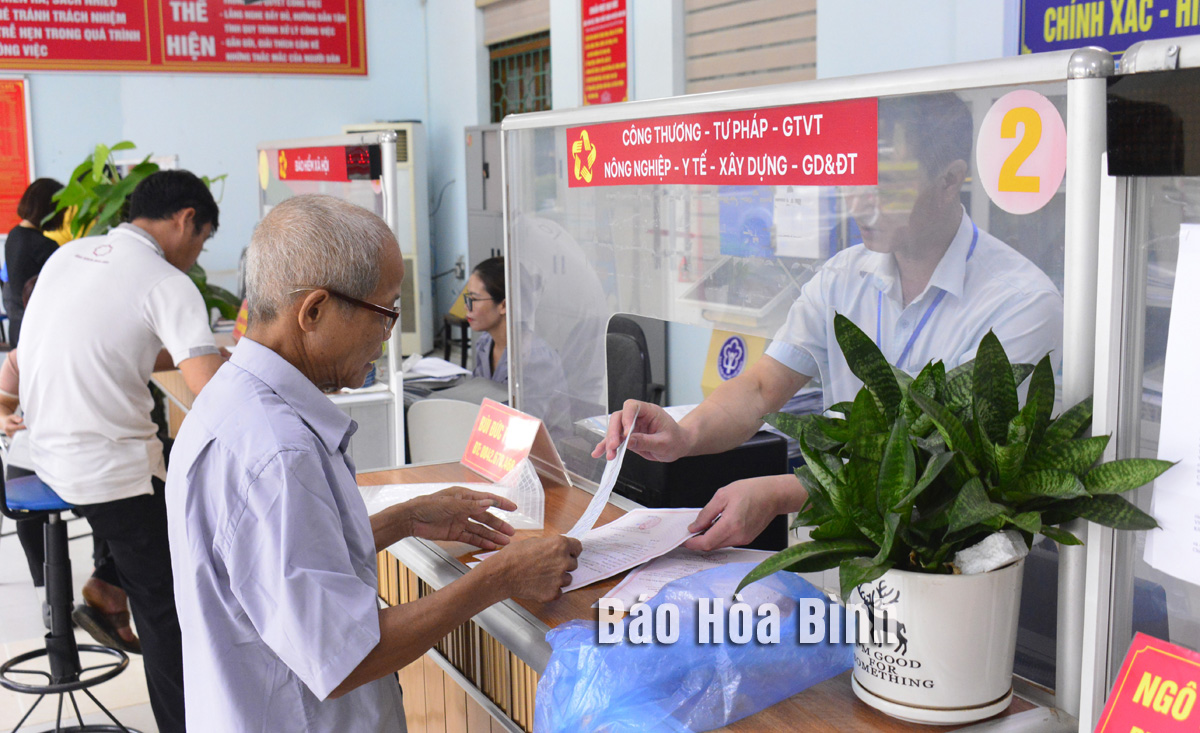
Kim Boi district has been actively implementing Resolution No. 18-NQ/TW, issued by the 12th Party Central Committee in 2017, which aims to streamline the political system for greater efficiency without disrupting operations.

Residents in Kim
Boi district carry out administrative transactions.
As one of the first localities to embark on this
reorganisation, Kim Boi expanded Bo town’s area and population in 2020 by
merging two neighbouring communes, Ha Bi and Kim Binh. Since then, Bo town has
stabilised its organisational apparatus and focused on leading the
implementation of political tasks.
The district has significantly reduced its
public sector workforce and administrative units. By November 30, 2024, the
number of public service units had been cut by 16 compared to 2017, and the
number of administrative units at the commune level was reduced to 17, down by
11. This restructuring also resulted in a reduction of 45 villages and 148
village part-time positions.
Despite the reorganisation, local government operations
remained smooth and uninterrupted. The simplified structure lowered staffing
costs, freeing up resources for development projects. By late 2024, the
district had resolved staff redundancies, reassigning or settling 218 surplus
commune-level officials.
On February 14, 2025, Kim Boi completed its
political system restructuring. The district’s Information and Education Board
and Mass Mobilisation Board were merged to become the district Information and
Education, and Mass Mobilisation Board. Several Party cells were dissolved,
established, or renamed to align with the new structure.
Kim Boi Party Committee Secretary Nguyen Hoang
Thu emphasised that while restructuring is essential for strengthening the
Party’s leadership, it requires unity, determination, and responsibility from
all officials and Party members.
The district is now focusing on implementing the
new organisational model and ensuring effective and unified operations across
all units.
Identifying the application of online public services as a key step in administrative procedure reform and e-government building, Kim Boi district has proactively provided services and supported residents and businesses in accessing and utilising full-process online public services promptly and efficiently. The locality aims to lift the rate of end-to-end online public services to over 90%, with all officials and civil servants handling tasks in the digital environment.
Nguyen Anh Tuyet, hailing from a family steeped in the ancient art of herbal medicine, is transforming local medicinal herbs into high-value concentrated extracts, elevating their worth and healing potential.
Nguyen Phi Long, an alternate member of the Party Central Committee, Secretary of the Hoa Binh provincial Party Committee, and head of the steering committee for the province's key projects, chaired a conference on March 25 to discuss measures for implementing the project on constructing the Hoa Lac - Hoa Binh road and upgrading the Xuan Mai - Hoa Binh section of National Highway 6 under the public-private partnership (PPP) model.
Administrative reform has been identified as a key priority in enhancing state governance, improving the business environment, and facilitating services for citizens and enterprises.
The Standing Board of the Hoa Binh provincial Party Committee met on March 18 to review and guide major investment projects aimed at boosting local socio-economic development.
The air is thick with the hum of drills and the clatter of machinery as the Hoa Binh – Moc Chau expressway takes shape amid the rugged terrain. Welding sparks illuminate the faces of workers, and concrete mixers churn relentlessly, laying fresh pavement on the newly-carved road. The construction site buzzes with a palpable sense of urgency, particularly in Hoa Binh province where the expressway's future is being forged.



